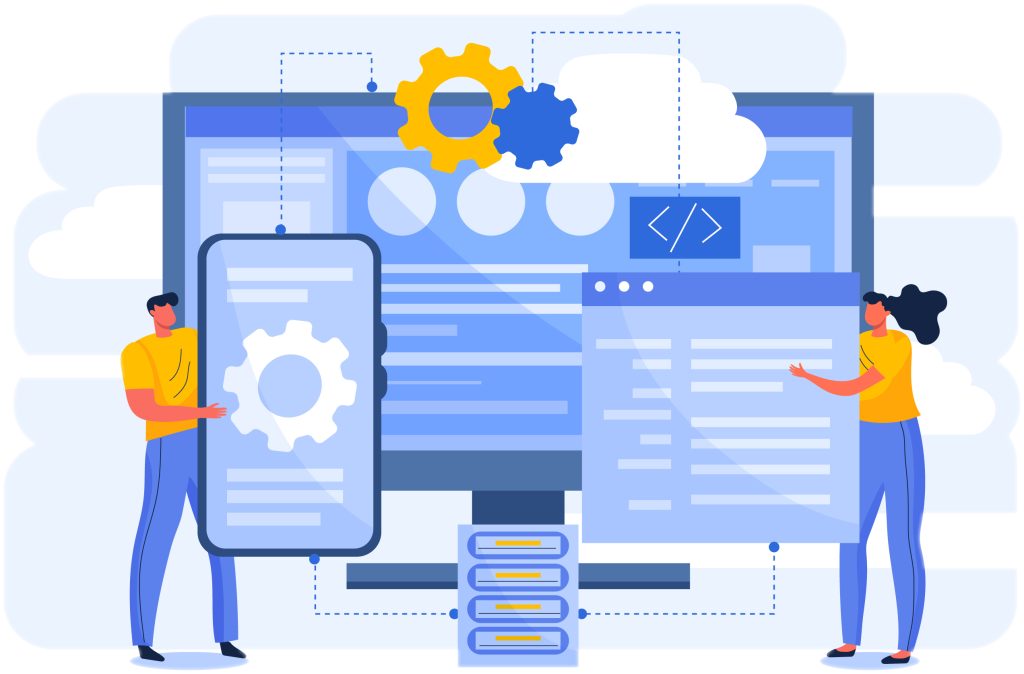Web programming has become an essential skill in today’s digital world. From creating informative websites to complex e-commerce platforms, web programming plays a crucial role in developing efficient and effective online solutions. In this article, we will explore what web programming is and how it can benefit your business.
What is Web Programming?
Definition
Web programming refers to the process of creating functional applications and websites through the use of various programming languages and technologies. It involves both front-end development (what users see and interact with) and back-end development (what happens behind the scenes, like the server and database).
Key Components
1. Front-End
HTML (HyperText Markup Language): Used to structure the content of web pages.
CSS (Cascading Style Sheets): Used to style and define the layout of web pages.
JavaScript: Used to add interactivity and dynamic functionalities to web pages.
2. Back-End
Programming Languages: Such as PHP, Python, Ruby, Java, and Node.js, used to build server logic.
Databases: Such as MySQL, PostgreSQL, MongoDB, used to store and manage data.
3. Frameworks and Libraries
Front-End: React, Angular, Vue.js.
Back-End: Django, Ruby on Rails, Express.js.
Benefits of Web Programming for Your Business
1. Professional Online Presence
A well-developed, professional website is essential for any business today. Web programming enables you to create an online presence that reflects your brand’s identity, enhances credibility, and attracts potential clients.
2. Customization and Flexibility
With web programming, you can customize your website to meet the specific needs of your business. This includes unique features, custom design, and integration with other tools and platforms.
3. Improved User Experience
Web programming allows you to optimize the user experience (UX), creating fast, intuitive, and easy-to-navigate websites. Good UX can increase customer satisfaction and reduce abandonment rates.
4. Process Automation
Through web programming, you can automate various business processes, such as inventory management, order processing, and customer service, increasing operational efficiency and reducing costs.
5. Accessibility and Compatibility
Websites developed with good web programming practices are accessible across different devices and browsers. This ensures that all users, regardless of the device they use, can access your site without issues.
6. Scalability
Web programming allows you to create scalable websites that can grow as your business expands. You can add new features, increase traffic capacity, and improve performance as needed.
7. SEO and Digital Marketing
A well-programmed website facilitates the implementation of SEO (Search Engine Optimization) strategies, making it more visible in search engines. Additionally, it can easily integrate digital marketing tools, like analytics, CRM, and email marketing platforms.
8. Security
With web programming, you can implement robust security measures to protect your customers’ data and your website’s integrity. This includes encryption, firewalls, and secure coding practices.
Conclusion
Web programming is a powerful tool that can transform your business’s online presence and bring numerous benefits. From customization and flexibility to process automation and improved user experience, investing in web programming can be the key to your business’s digital success. If you haven’t yet explored the possibilities of web programming, now is the perfect time to start.
FAQ
1. What is the difference between front-end and back-end?
The front-end refers to the client side, what users see and interact with, while the back-end refers to the server side, where the logic and data management occur.
2. Do I need to hire a web developer to create my website?
Although there are website-building tools that don’t require technical knowledge, hiring a web developer can offer a level of customization and functionality that building tools generally cannot provide.
3. How can web programming improve my website’s SEO?
A well-programmed website can be optimized to load quickly, be responsive across all devices, and have clean code structure, all of which contribute to better rankings in search engines.
4. What are the most common programming languages for web development?
The most common languages include HTML, CSS, and JavaScript for front-end, and PHP, Python, Ruby, and Java for back-end.
5. What should I look for when hiring a web developer?
Look for experience, a portfolio of previous work, communication skills, and knowledge of the latest technologies. Also, check for client references and feedback on previous projects.



